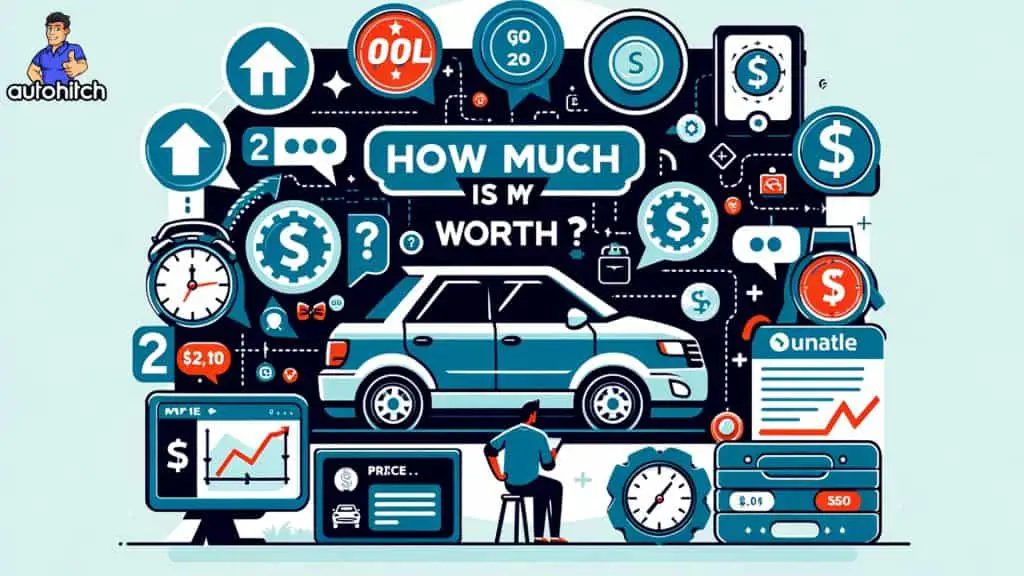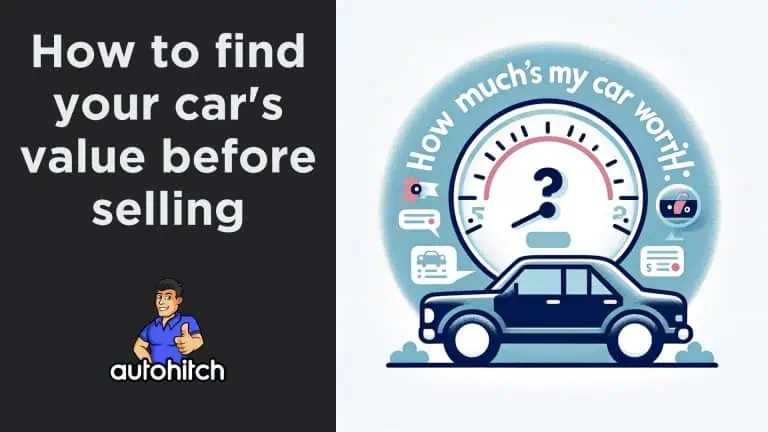If you’re thinking about selling or trading in your car, the very first question you probably have is “how much is my car worth?”
The short answer: Your car’s value depends on multiple factors like:
- Year
- Make/Model
- Mileage
- Condition
- Location
As a former used car dealer, I can tell you that the simplest way to break down the value of a car is that it’s worth what someone is willing to pay for it.
Below, I will address how to determine what your car is worth by sharing how dealers do it every day…
Key Takeaways:
- Get quotes from dealerships (Carmax/Auto Nation) and instant online offers (Carvana/Vroom) to get specific offers. Having real dollar figures helps you understand current market demand.
- Use online price guides like Kelley Blue Book and NADA to estimate value ranges based on your car’s specifics.
- Timing, preparation, and choosing where to sell impact the price.
- Regular documented maintenance and repairs increase value. Mileage and condition decrease it.
- Understand your car’s worth to get the maximum price and make the best decisions.
Relevant Articles to Read:
- The Best Trade In Value Car Dealership
- How To Sell A Car Online
- How To Sell A Car
- How To Sell A Car Without Getting Scammed
Table of Contents
Getting Accurate Valuation of Your Car’s Worth
The first step is determining your car’s fair market value based on its make, model, year, mileage, location and overall condition. Here are some valuation methods I compared:
1. Online Price Guides
- Kelley Blue Book – Gives trade-in, private party, and dealer retail values. Easy to use calculator.
- NADA Guides – Uses nationwide transaction data. Values widely used by dealers.
- Edmunds – Detailed calculator with instant appraisal based on location.
2. Dealership Quotes
All of these guides and websites get you an idea of what your car is worth, but wouldn’t it be more helpful for someone to give you a specific number?
That’s where dealerships like Carmax and Auto Nation, or online dealers like Cravana and Vroom come in.
These outlets will give you an actual dollar amount offer for your car, and when you combine two or three of these, you get the absolute best idea of what your car is worth based on your specific vehicle, not an average of everyone else’s car.
Remember: These offers will be wholesale prices, so you will still have to add more on to the price if you plan to sell privately at retail.
- Get offers from local dealerships and online dealerships. Let them do all the work determining the condition of your car and what it’s worth.
- Online retailers like Carvana also provide instant offers, but the accuracy of your initial offer is determined by your honest answers on their online form. If you don’t enter honest answers, the offers you get will not be accurate.
3. Checking Market Listings
- Search local classifieds and listings on Autotrader to see actual asking prices for similar vehicles.
4. Professional Appraisal
- Paid inspection and appraisal from a certified professional. Most accurate determination of true market value.
I made sure to get quotes from both dealerships and instant online offers. Comparing all these sources gave me an accurate value range to use in negotiations.

Factors That Impact Used Car Values
Many elements can increase or decrease your car’s value. Being aware of these helped me price and prepare my car competitively:
Key Factors Affecting Car Value
| Factor | Description |
|---|---|
| Vehicle Age | As a car ages, its value typically decreases, except for vintage or classic cars. |
| Make and Model | Some brands and models retain their value better due to their reputation for reliability and demand. |
| Mileage | Higher mileage can indicate more wear and may reduce a car’s value. |
| Vehicle Condition | Cars in better condition without mechanical issues are valued higher. |
| Current Market Prices | Prices for similar cars in the marketplace can set a benchmark for a car’s value. |
| Location | The value of a car can vary based on demand in different geographic locations. |
- Mileage – Lower miles mean higher value. The average is 12,000-15,000 miles per year.
- Condition – Dents, stains, worn parts, and mechanical issues reduce value. Detailing helps.
- Specs and Options – Things like leather seats raise value. Aftermarket modifications often lower it.
- Make/Model Reputation – Toyota and Honda have great resale value due to reliability.
- Location – Demand varies regionally. AWD and convertibles are worth more in certain climates.
- Maintenance History – Complete service records show the car was well cared for.
- Accident History – Major accidents can reduce value by 10-30% even after repairs.
- Vehicle Age – Depreciation is highest in the first 1-5 years. After ten years, values drop fast.
Average Car Values
Below is a table I put together as a representation of how much a car is worth in different scenarios based on its condition. As you can see, trade-in value is always the lowest, and that’s important to remember when you visit the dealer:
The dealer is not there to give you fair market price, they are there to make money!
| Car Condition | Trade-In Value | Private Party Value | Dealer Retail Value |
|---|---|---|---|
| Excellent | $$$$ | $$$$$ | $$$$$$ |
| Good | $$$ | $$$$ | $$$$$+ |
| Fair | $$ | $$$ | $$$$ |
| Poor | $ | $$ | $$$ |
*Values are symbolic and represent the hierarchy of pricing across different sales avenues. The ‘+’ symbol signifies a value that is higher than the base value for the condition listed, reflecting premium features or a particularly well-maintained vehicle within that category at a dealership.
Tips to Maximize Your Car’s Value
Here are some things I did to get top dollar for my used car:
- Detail Inside and Out – A thorough cleaning (And I’m talking about a real detail) makes a big impression on potential buyers.
- Gather Service Records – Complete documentation conveys your care for the vehicle.
- Make Minor Repairs – Fix minor issues like dents, faded paint, burned out lights.
- Get a Vehicle History Report – Provides assurance to buyers about any past accidents or uses.
- Take Quality Photos – Showcase your car’s best features and condition when listing for sale.
- Sell Privately – You can typically get a higher price compared to trade-ins and dealer offers.
Proper preparation and choosing the right buyer definitely helped me get top value. Patience for the right buyer is key too.
Why Knowing Your Car’s Value Matters
There are a few key reasons why understanding your car’s current value is so important:
Selling Your Car
Researching value helps you set the right list price and negotiate fair offers from buyers. It saves you time and guesswork.
Trading In Your Car
Trade-in offers are often far below market value. Knowing what your car’s worth and what other dealers are paying for your car allows you to negotiate a higher trade amount.
Insuring Your Car
Insurers use market values to determine premiums and payouts for total losses. Accurate valuations prevent disputes.
Refinancing Your Loan
When refinancing, lenders assess your car’s value versus any balance left. Higher value means better terms.
Budgeting Expenses
You can estimate repair costs based on average parts/service prices for your car’s make and model when issues arise.
No matter why you need to know what your car’s worth, taking a multi-pronged approach will get you the most accurate number.
I compared online guides, dealer offers, market listings, and got a professional appraisal before selling my cars (Both as a dealer and as a private seller).
In the end, having this knowledge helped me maximize my car’s value and make the best financial decisions.
Most Popular Online Car Value Tools
Car Valuation Tools & Resources Table
| Resource | Type | Description | Best For |
|---|---|---|---|
| Kelley Blue Book | Pricing Guide | Offers estimated ranges for trade-in and private party. | Car Owners, Buyers, Insurance |
| NADA Guides | Pricing Guide | Provides values for cars based on transactions. | Dealers, Auto Lenders |
| Edmunds | Pricing Guide | Delivers “true market value” based on dealership sales. | Car Owners, Dealers, Buyers |
| Carvana | Online Retailer | Provides instant offers for purchasing cars. | Sellers looking for quick transactions |
| CarMax | Car Buying Service | Gives instant offers and conducts in-person appraisals. | Sellers seeking convenience |
| Autotrader | Marketplace | Lists prices for private and dealer vehicles for comparison. | Buyers, Private Sellers |
Here are 10 top resources I recommend to start valuing your car:
- Kelley Blue Book – Trusted pricing since 1926. Instant cash offers available.
- NADA Guides – Detailed used car reports with up-to-date market pricing.
- Edmunds – User-friendly instant appraisal calculator. Helpful articles.
- Autotrader – Compare local dealer and private party asking prices.
- Carfax – Car value based on unique vehicle history and records.
- TrueCar – See recent transaction prices in your area.
- Cars.com – Get offers from dealers after entering your car’s details.
- CarGurus– Deal ratings help identify pricing “Great Deals” vs “Overpriced”.
- CarMax – Get an instant offer or in-person appraisal. Stores nationwide.
- Vroom – Receive an online instant cash offer with free pickup.
My Closing Thoughts
Running your car through these valuation sources is a great starting point to gauge its overall market value. You’ll be armed with the information needed to maximize your car’s worth at sale or trade-in.
Sources and Citations
- https://finance.yahoo.com/news/9-things-increase-car-value-090600406.html
- https://www.wikihow.life/Increase-Your-Car%27s-Resale-Value
- https://www.coxautoinc.com/market-insights/estimated-monthly-used-vehicle-saar-and-volume/
- https://www.marketwatch.com/guides/buy-or-sell-car/car-value-calculator/
- https://www.cars.com/articles/what-affects-my-cars-value-1420680457955/
- https://www.marklines.com/en/statistics/flash_sales/automotive-sales-in-usa-by-month-2022
- https://www.investopedia.com/articles/investing/090314/just-what-factors-value-your-used-car.asp




